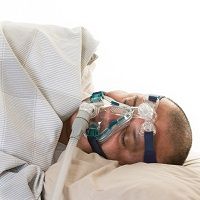Article
CPAP May Aid in Patient Weight Loss
Author(s):
Over the course of 16 weeks, OSA patients receiving CPAP treatment lost 5.7 pounds more on average than patients not receving CPAP therapy.

For obese patients with obstructive sleep apnea (OSA), using a continuous positive airway pressure (CPAP) machine to treat their sleep disorder may be a way to lose weight as well as treat their symptoms, according to the results of a new study.
The study, which was presented at the Endocrine Society (ENDO) 2019 Annual Scientific Sessions in New Orleans, LA, found that OSA patients undergoing CPAP treatment lost an average of 5.7 pounds more in 16 weeks than OSA patients who did not receive CPAP therapy.
To determine the impact of CPAP therapy on weight loss, investigators evaluated medical records of 501 obese adults treated in a weight loss clinic at the University of Arkansas for Medical Sciences from Jan. 2014 through Aug. 2017. All patients underwent an intensive 16-week program that included eating a diet of 800 calories a day, exercise programs, and weekly individual counseling and cognitive behavioral therapy.
Of the 501 patients, only 300 met eligibility criteria and they were divided into 3 groups based on their self-reported OSA symptoms. The average age of the group was 55 years old and contained 236 (78.7%) women. Patients had to be between 18 and 65 years old and have a body mass index equal to or greater than 30 but less than 50 to be eligible. Patients who suffered from thyroid dysfunction, uncontrolled diabetes, active infection, active malignancy, or end-organ damage were excluded
Those 3 groups were patients with no reported symptoms (89), patients who had OSA symptoms but did not receive a CPAP machine (164), and patients who reported symptoms and received a CPAP machine (47). OSA severity could not be determined because not all patients had a sleep study.
After the 16-week program, patients with concurrent CPAP treatment lost an average of 5.7 pounds more than the patients who did not treat their sleep apnea. The 47 patients in the CPAP-treated group, lost more than 26.7 pounds on average versus the almost 21 pounds shed by patients who did not treat their OSA symptoms using CPAP. The group without OSA symptoms lost approximately 19 over the 16-week period. After adjusting their analysis for patients’ beginning weight, age, and sex, the investigators still found a correlation between CPAP treatment and weight loss.
“Some people may think if they lost weight, they may not need the CPAP machine,” said lead investigator Yuanjie Mao, M.D., Ph.D., an endocrinology fellow physician at UAMS. “However, our study finds the opposite for people with obesity and OSA who try to lose weight by restricting calories: CPAP treatment can actually result in more weight loss.”
Mao suggested that sleep quality and underlying neuroendocrine changes might explain their results. CPAP treatment can enhance sleep quality and some research shows that good sleep quality may improve weight control.
The study, “The Impact of CPAP on Intensive Calorie Restriction Weight Loss,” was presented at ENDO 2019.





